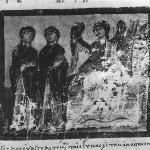Thanks for the challenge, Tony. This was a great exercise. Strangely, when I sat down to try and write something substantive about God I found that I couldn’t stop clearing my throat, which I believe affirms your suspicion that our reticence to talk about God has at least something to do with worries about how it will be perceived. For me, it was the qualifiers: “not about Jesus, not about the Bible, but about God.” I find it impossible to talk about God without talking about Jesus, and impossible to talk about Jesus without talking about the church. To abstract our ideas about God from Jesus and the church will ultimately make them unintelligible. So I’m ignoring the qualifiers for the sake of coherency. Nevertheless, here’s my attempt to say something substantive about God:
A nerdy preface seems unavoidable so I’ll make it short:
I believe in the Trinity, so I believe God exists as a community of ecstatic love: Father, Son, and Holy Spirit. God names not merely a thing but a relation. God is a relational God bound together by love. Before God is anything else, God is love. It’s not that first God exists and then God decides to love. It is love which constitutes God’s very existence. Moreover, God’s love is not self contained, but it extends to all creation. God’s mission is to love creation. That’s straight up missional theology.
Okay – Sorry about the nerdy preface… but it’s important to know that God’s being is love, and God’s mission is love. If you know your algebra, you know this means God’s being is God’s mission. The being and mission of God are inseparable. Here’s why this is important.
If we want to know God (and if we want to be able to say something substantive about God), we have to participate in the mission of God. Without engaging in mission we can possess knowledge about God, but we can never truly know God. To know God is to participate in God’s mission. So, in the words of the immortal Jefferson Airplane, if you want to know God, “You better find somebody to love.” (Yeah – dig it, Grace Slick. If you want to laugh check out the guy just chilling on stage w/the band at 00:51 in the clip)
As Christians, our efforts toward mission – the pursuit of justice, mercy, forgiveness, peace, and so on – are not merely behaviors we engage in because we belong to God. These things are an essential part of how we come to know God in the first place. We don’t come to know God and then engage in mission. We engage in mission in order to know God, because the being and mission of God are inseparably linked.
Robert Jenson was lecturing in one of my theology classes once, and he said that he believes that all of the disunity in the church can be traced back problems, errors, and disagreements concerning the doctrine of God. I think the biggest errors in the doctrine of God are connected to an abstraction of God’s being from God’s mission. It’s not that first God exists then God engages in a mission of love. God’s very being is constituted in a mission of love. When we bifurcate the being and mission of God, we make God into an abstraction – an idol that we can control and appease, and we no longer have to live in love (engage in mission), in order to know God. Knowledge of God becomes merely knowledge about God… it remains academic. God, tragically, becomes an abstraction: just an object in the universe. The end result is that if we separate God’s being and God’s mission then we never really have to follow God. We never really have to love anyone, and it simply doesn’t work.
If I am going to know God, it turns out, I need you. I need other humans. I have to find somebody to love.
I heard a rabbi say once that the Decalogue’s prohibition against making graven images was as much about respect for humankind as for God. God seems to have decided that humans are meant to be the only legitimate image of the invisible God. All other images of God are prohibited. If we want to see God, we have to learn how to live together in love. Human beings are to relate to one another in love not out of some sense of piety, but because this is who God is. Only in relating to human beings in love (and it must be said, relating to ourselves, and even the created world), will we discover who God is and what it means to experience the kind of relationship with God which can set us free, and heal our broken hearts. It’s the only way to actually become human as human was meant to be.
My friend Whiskey, who comes to my church each week, lives on the street (actually in the woods, I think), and as his name suggests, he is hopelessly addicted to alcohol. He used to ride trains, but he’s to frail for that now. Alcohol has taken a terrible toll on his body. He can barely walk with a cane and falls down a lot. Whiskey is probably going to die from his alcoholism and seems resigned to being an addicted until that happens. I could despise Whiskey for his addiction and his homelessness. But this is not the way to know God. Instead I just live in friendship with him – even though there is nothing I can do to help him get better. I don’t live in friendship with Whiskey because I know God. I live in friendship with Whiskey so that I can know God.
The folks in my church love this ex-rail-rider named Whiskey not because it is easy, but because they seem to have learned that is how they will come to know God. That’s who God is – God is the one we meet in the face of the brokenhearted. That we have somehow come to learn to see the spark of the Divine in the weather-beaten face of our friend Whiskey has taught us what it means know God.
















